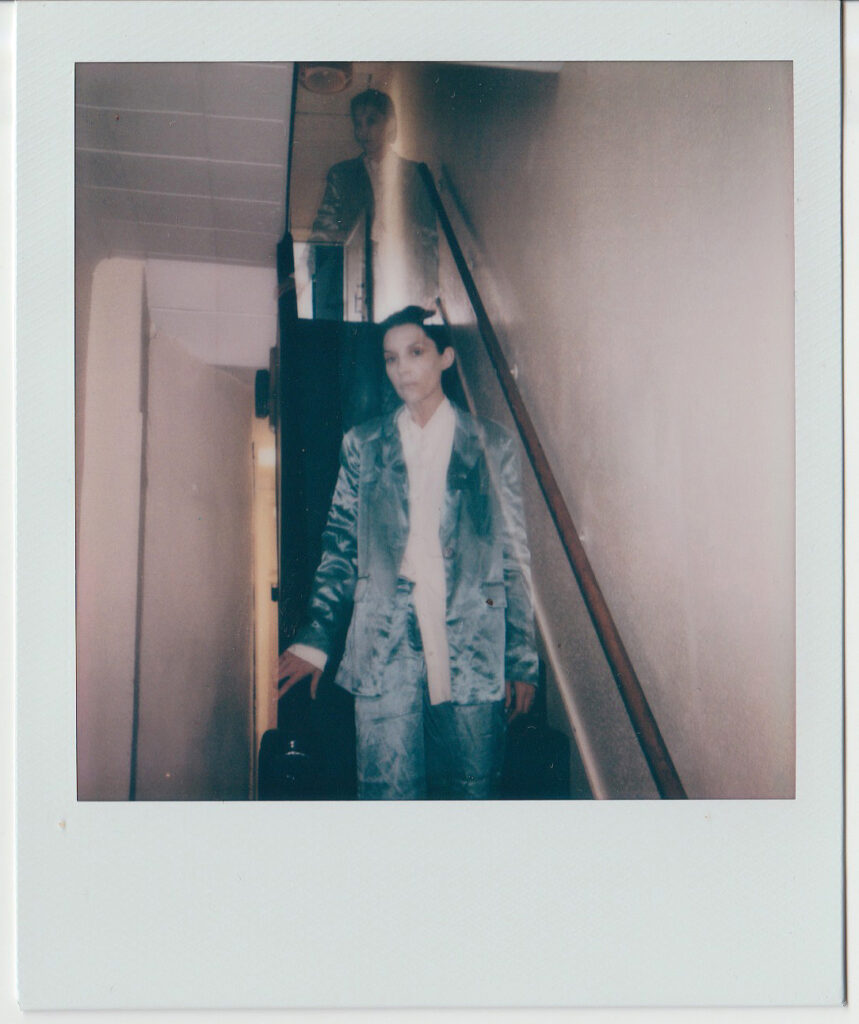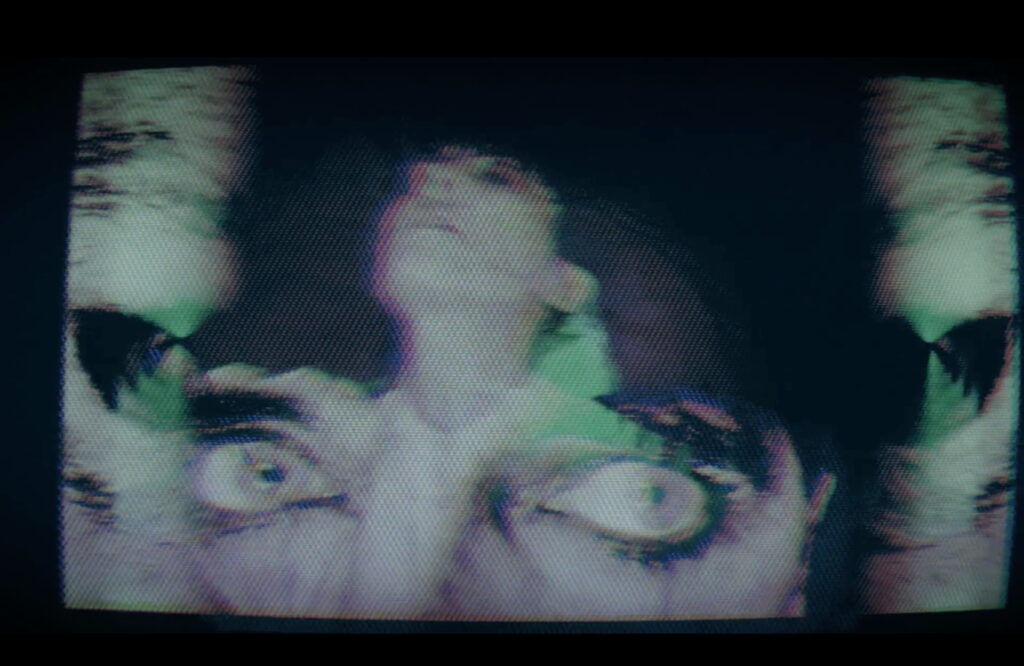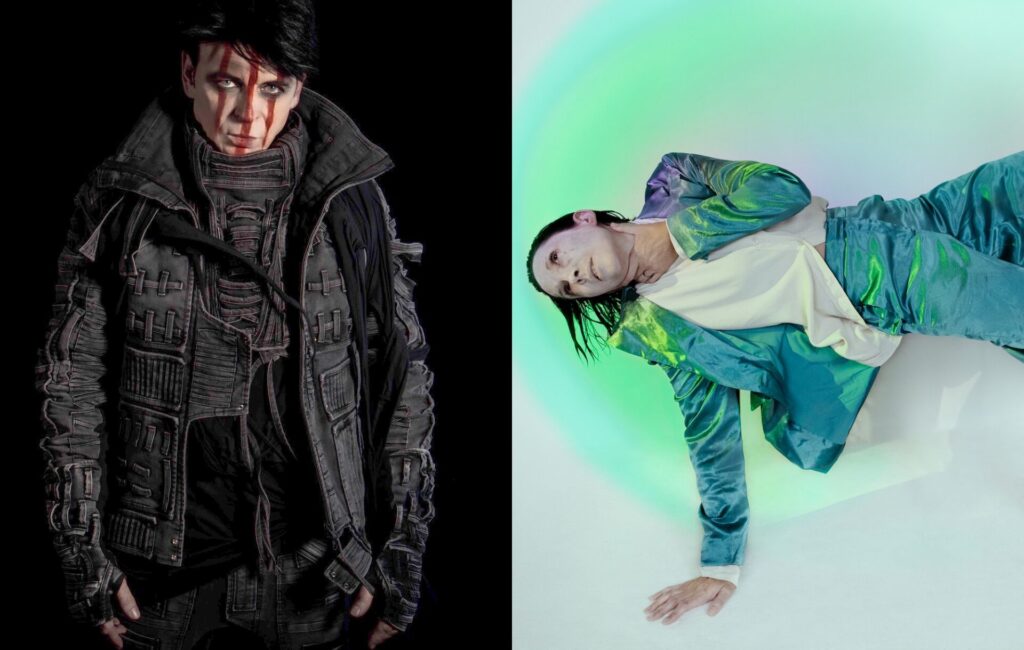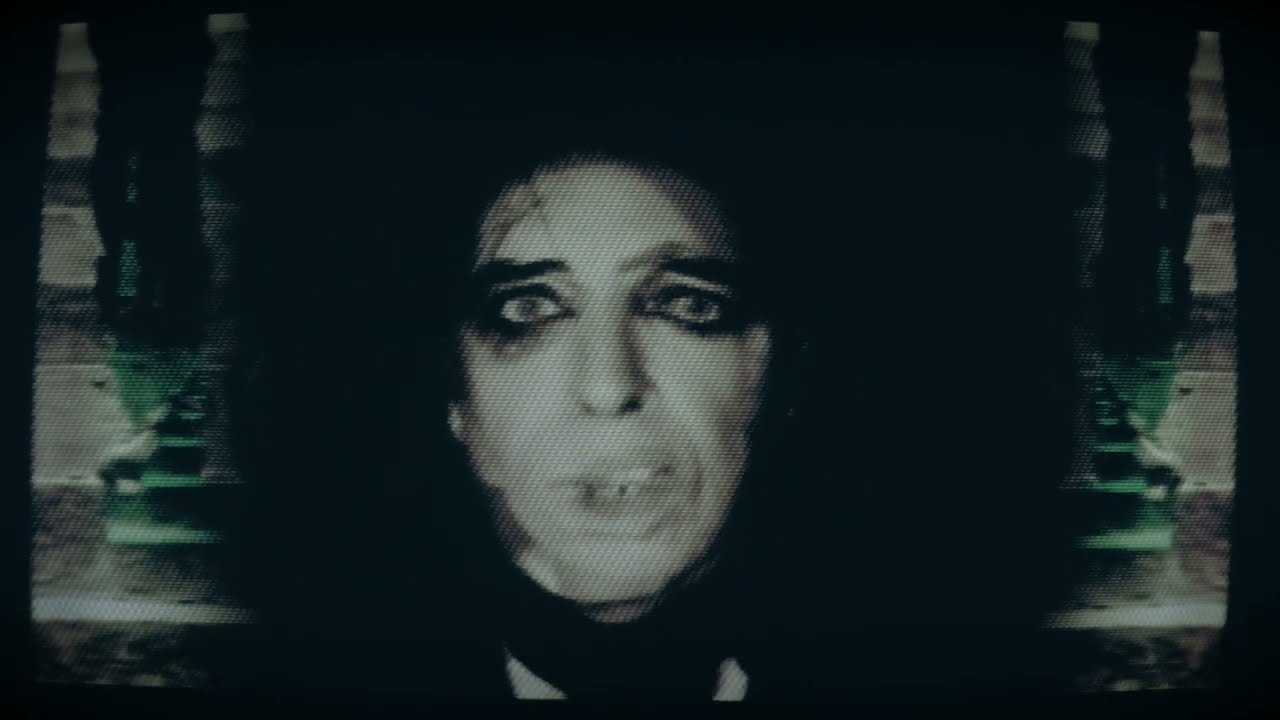Music writers. Who needs ’em? We recently had the opportunity to get two of tQ’s all-time favourite musicians – Elizabeth Bernholz aka Gazelle Twin, and Gary Numan – together. We left the two to have a conversation about their work without any interference from us.
Last year, Gazelle Twin released her fourth studio album Black Dog, one of 2023’s finest, and has just released a follow up called Shadow Dogs, which sees the tracks reinterpreted and reworked with the help of collaborators including Keeley Forsyth, Marta Salogni, Penelope Trappes, Mark Jenkin, Sealionwoman and BEAK>.
The title track of ‘Black Dog’, meanwhile, has been handed over to Gary Numan and his long-time producer and collaborator Ade Fenton. You can see an accompanying video for their take below, which sees Numan and Gazelle Twin sharing lead vocals.
Gazelle Twin has also just been announced as Artist in Residence at Kings Place, London, which will launch in January.
Gazelle Twin Interviews Gary Numan
Hello Gary! Thank you for being a part of the Shadow Dogs LP and together with Ade Fenton, making an absolute belter of a version of ‘Black Dog’. I absolutely adore it and always will. The Black Dog album was inspired by ghosts and an experience I had as a child in the family home. In a 2013 interview with John Doran for Noisey you talk about the grey ghost you and your friend both saw at Piccadilly underground station in London, and how it influenced the song ‘Are “Friends” Electric’. Have you ever had any other encounters with ghosts or things you can’t explain since then? What do you think they are, and do they scare you too?
I’ve had several encounters over the years actually, quite a few recently in fact as we bought a house in Scotland in 2022 and things happen there all the time. My own little theory on what ghosts could be, or rather how they might exist, is quite simple. I suspect it’s a mistake of nature. At the moment of death some glitch occurs that prevents the journey from this life to the next taking place as it’s supposed to, leaving a remnant of the person behind. However, it often seems to be a moment rather than a person that lingers, which ruins my little theory somewhat. At the Scottish house we have all heard people talking from rooms that are empty. I even banged on the wall once thinking it was my children being way too loud in the early hours, only to find they were asleep and in a different part of the house completely. Persia and Raven have seen figures moving across the room, we’ve all witnessed doors slamming, footsteps, even the doorknob of a bedroom being rattled and turning one night when no-one else was in the house. Gemma once ventured out at about 2am as she could hear two people talking on the floor above when we were the only two in the house. The talking stopped the moment she called out ‘Hello’. Strangely enough any of this would have terrified me when I was younger, enough for me to have sold the house and never gone back. I’m a little braver these days and I’ve become more interested in who it is and why they are there. But, I still find it all very unnerving. I won’t go outside the bedroom in the night when we’re staying in that house.
I also find it so fascinating that you embodied the ghost you saw in a new stage persona, adopting the same grey hat and coat. It’s as if you are embodying the thing you fear to embrace it somehow. Is that accurate? Does fear motivate you?
I think in many ways it’s our fears that drive us. For me it’s not necessarily to do with the past, or things that I carry with me, it’s more to do with a fear of not doing enough with my life. Not achieving enough, not protecting enough, not delivering a good enough quality of life for my family. I’m frightened of running out of time, which obviously gets worse as each year goes by. All past mistakes I’ve made, of all kinds, I learn from to hopefully make me a better person, so I don’t feel haunted by my past. I accept that making bad decisions, doing bad things at times, are all part of growing into the person you would like to be.
Your music has been heavily sampled over the decades. There’s something ghostly about sampling and even recordings themselves to be honest. What are your thoughts on this?
I think that’s a very lovely way of seeing inspiration. Sampling is something some of us were doing long before samplers were invented. It felt very creative and generally involved creating new sounds by heavily manipulating existing sounds that had little, if anything, to do with music. Bits of concrete being dragged across a manhole cover for example, and a thousand other things along those lines. The trick was to find a way of making those ‘new’ sounds musical. Creating music without using musical instruments was quite important to me for a while. I think the idea of ghosts hiding in music is very true when you think of it in terms of inspiration. We listen to things constantly, see things, experience things, be it music, paintings, poetry, film, conversations, whatever. That experience is absorbed and becomes part of where our own ideas come from. Not in a blatant copying kind of way (that’s not being inspired, that’s just stealing), but in the sense that those things become part of who we are, they help shape who we become. In that sense we are haunted by almost everything we are exposed to.
The melodies in your songs are deeply satisfying and often quite emotional in my view. Using very few notes, many of your melodies are now iconic hooks. I’m interested to know what music you listened to growing up and what “went in” during your formative years?
When I was very young I listened to the music my parents played, and they did so often, and I really enjoyed much of it. Mostly 50s artists if I remember correctly. I didn’t really start to choose what I listened to until The Monkees came along in the late 60s, but I still loved much of what my parents had played me. The first band that I believe genuinely inspired me though, that really ‘went in’, was T-Rex in the early 70s. After that I became obsessed with music in general and listened to a wide variety of things. Bowie was a big favourite for a while but I was listening to a lot of different things throughout my teenage years. I think I’m still learning though, still coming across things that make an impact, that inspire in various ways.
I was really amazed to discover Prince was a fan of yours and could then immediately see the influence on his Purple Rain era. I remember watching your 1979 ‘Are “Friends” Electric’ TOTP performance and noticing how similar his facial expressions were in his performance of ‘Purple Rain’, not to mention his production and synth work, and on ‘1999’ etc. Were you a fan of his? Was he ever an influence on you?
I’ve read a lot of things about Prince listening to my stuff, talking about me, which I find incredible. A real honour as the man was a true genius, on many levels. I was a fan of much of the music he made, a huge admirer of his talent. I can’t think of any specific thing he did that directly influenced me but, as I was saying before, we absorb all these things and they become part of us. With that in mind he will definitely be in there somewhere, so who knows how that could find its way into my own thoughts and ideas and re-emerge at some point. I think that’s true of everything, and everyone, that we are exposed to, particularly so if we enjoy what they do.
There’s not a lot of room for risk-taking or “weirdness” or even more conceptual ideas in mainstream pop these days, especially when looking back at programmes like Top Of The Pops from the 70s, 80s and 90s to now. Did you encounter pushback for your music and appearance at this same time and through the decades? Do you think things have become too sanitised? Should they change still?
I had a fair amount of push back, yes, to put it mildly. Electronic music wasn’t seen as ‘real’ music at all in some areas. Whenever something new comes along, especially something as wide ranging as an entirely new genre of music, it will have its enemies. People that don’t see the need for it, don’t like it, don’t appreciate the changes that it brings. Some of those people tend to see the artists bringing that new type of music as the enemy as well. It can get very hostile, very aggressive.
Making music that challenges the norm is risky for an artist as it’s less likely to get the label support it needs to find an audience. Radio support is extra difficult to get (it’s always difficult) and so the chance of succeeding doing something experimental, something truly innovative, is low indeed. Thankfully there are artists who are interested in the music more than fame and fortune and are prepared to continue making the art they make, accepting that success will be far harder to find.
I’m not sure that things are different now. My belief is that things have always been difficult for people that create outside of the mainstream. In some respects, and I accept not everyone will agree, with social media there are perhaps more opportunities for more alternative artists to be discovered today than there was pre-internet.
You’ve been touring extensively for a long time. I am always amazed by your touring schedule and the heavy, hard work it must require to do that year in and year out, and with family on board as well. I often wonder how you do that? What keeps you going?
Two things really. The first is I simply love doing it. It makes me feel like I’m doing something worthwhile with my life. It is hard going at times, very much so actually, but it’s also exciting and fun. I love the friendships, the traveling, the thrill, the challenge. It keeps me young, keeps me active. The other thing that keeps me going is around 70 per cent of my income comes through touring. It’s the primary way I provide for my family now that streaming has changed the way we earn from making albums. I’m just extremely lucky that I earn a living doing something I love. Not many people have that. There are plenty of successful musicians that hate touring. That must be a nightmare as it must be a very difficult thing to do if you don’t love it.
You have remained prolific in recent years. I remember seeing you at Brighton Dome and your daughters, who are now women, were still tiny but were there on stage with you. So, did becoming a parent change the way you made music and the themes in which you worked?
I think the most constant theme in my music has been to look at the human condition and how it might be affected by the events of the day. How technology might change us for example, how religion affects us, how climate change might create a new world for us to try and survive in. With the album I’m working on now I’m looking at how AI could signal the end of humanity entirely. The children coming along hasn’t really changed any of that. I remain fascinated by the flaws of humanity, our stupidity, our cruelty, our greed. I look ahead constantly and try to predict possible outcomes, and then write about the more dramatic of those possibilities.
What did change with the children was my total abandonment of selfishness. Before they were born my life revolved around me, now my wants and desires are very much at the bottom of the list, if they make the list at all. I live to make their lives as good as they can be. It’s that simple.
What or who inspires you to keep making music now? Where do you find your sources of inspiration?
I’m nowhere near achieving the things I’d like to achieve, but that goes beyond music, so I feel driven by something close to desperation. I’m racing time, and losing. Without wanting to sound morbid or ridiculous I feel life rushing by and it frightens me. I want to do so much more before I run out of time.
I find simply being alive in the world today hugely inspirational. Given that my most consistent fascination is where humanity is heading, to be alive at a time when the world is dying, and AI is on the cusp of becoming indispensable to life, and so will soon control the destiny of man, is just incredible. I might actually be alive long enough to witness the beginning of the end of mankind. I find the possibility of that terrifying of course, but as a creative person that is seriously inspiring.
What does the future ghost of Gary Numan look like? What ghostly form would you take, if you could choose.
I’ve written a number of songs where long after I’ve died I find ways of reaching out to Gemma and the children. A sigh in the wind, a feeling in a dream, a thought in the dark, a whisper in the breeze. It’s a lovely thought to think you could somehow be a part of their lives still. That you could gently calm them when they’re anxious, lift them up when they’re sad, without them realizing that it’s you influencing the way they feel. I think it would be better to be a part of their thoughts, something they feel, like a sense of being loved, rather than a thing they could see. They need to move on, a parent needs to become a happy memory. Those words of wisdom need to feel like they’re own.

Gary Numan interviews Gazelle Twin
You mentioned a black dog shadow that you used to see in your childhood home. So, what exactly was that childhood experience and how did it end up on the album?
In my childhood home in southern Kent, I used to watch a small dark shadow by the bedside. It had a snout and would shuffle about next to me. I wasn’t scared, and I didn’t know what it was until many years later when talking to my brother and Dad who used to see it too. It was a dog. We moved away quite suddenly when I was only five, and as I grew older more stories unravelled about various strange things happening there. Black dogs in folklore are often seen as a bad omen, and although it certainly could just be coincidence, not long after we moved away the hurricane of 1987 blew the chimney stack down and smashed the whole roof in. It would have been the end. It makes me shiver to think about it. I’ve been obsessed with ghosts since but I’m very scared of them and what they are. But that fear makes me want to understand everything about them and experience more encounters. It’s interesting what you say about the idea of a ghost being an experience that is stuck or like a recording looping. In the years I spent reading about ghosts and listening to stories I found there to be a really strong link with the symptoms of depression or PTSD, something traumatic or violent stuck on a loop. The cycle needs to be broken somehow… by a priest or a therapist!
I first started to use images as something to hide within, a confident persona projected that allowed the shy real me to walk on stage and do something I was entirely unsuited for. What’s the purpose of your masks and costumes? Are they meant to scare your audience or are they doing something else?
Yes! I think it’s the same reasons. Hiding in plain sight, or masking, in the sense that we have to project a different version of ourselves to overcome the absolute chaos that being on stage can generate for a shy anxious person. In my case I did it literally – using masks. It’s interesting that you talked about attempting to convert a negative energy into something positive. I never set out to work in this particular way, I initially wanted to use costume to overcome the awkwardness of being “myself” on stage but also to neutralise my identity so I could make concept albums about anything I wanted and change all the time. The use of masks and costumes enabled me to do so much more than I ever imagined and have given me the confidence to go further with my ideas. On my second album, Unflesh, I was processing some teenhood traumas I had otherwise buried. It was therefore a really visceral album where I discovered my screaming voice. I felt vengeful. I was voicing the trapped and traumatised teenaged version of myself. And so I decided to wear the clothes that fit the era and the setting – my school PE Kit; royal blue tracksuit, white socks and black pumps. It felt amazing because it was like getting a second go at being back in that body but being able to do things differently – almost supernaturally – and rewrite the past. Black Dog delves into deeper, older childhood fears, tracing them all the way into the present version of myself as someone who struggles with anxiety and depression regularly. It’s the most “me” I have ever been, I have no mask on. It’s like I’m a medium allowing the ghosts of myself to come out and speak. It all sounds very, very intense indeed. I think I have unintentionally cultivated a sort of fear-processing factory!
The production of a song is vitally important. A song can travel in many directions before it’s finished, and some directions are far better than others. What elements are important to you when producing?
I love to use samples to form loops from fragments or weird, old recordings or field recordings on phones etc. I like there to be a sense of a real world. I like textures and don’t want things to be clean all the time. I like to explore sound as experimentally as possible. In Black Dog I built the majority of the record on samples that I had made from a VCS3, Moogs, theremin, cello by my friend Alex, and a very old cassette tape recording of my sisters playing piano in my childhood home before I was born. I was trying to be rigorous in working with the idea of ghostliness in as many forms and methods as possible. One song was made by sampling a dead demo I’d given up on, so it was just a ghost of itself. Lean and satisfying melodies are important to me also and there’s a lot more melody in Black Dog than in any of my other records, I think. We recently got to do it with an orchestra and I felt satisfied that I have finally reached a point where I feel like all the music that has been in my body since being a kid has finally found a way out. I want to do much more of that. I adore orchestral music. I’m generally game for anything and like to shake up the things I use to make songs/scores as much as possible. With digital interactions it can get really one dimensional. I play real instruments a lot more now, like a range of recorders, percussion. I am building up a tiny collection of synths and gear to take me away from the desk a bit more. I will always love the capabilities of synthesisers and digital music production. It always comes down to what makes a song work though, and for me it is the simplicity that is key but always the hardest thing to get to.
You grew up in the 80s and 90s. What influences from those times, if any, really embedded themselves in you, and in particular your creativity?
Oh, when I was little it was nearly all classical music and jazz that my parents played in the house, not much else. We didn’t have TV or radio on other than car journeys to school and back. I was the youngest of four, and when my much older teenaged sisters and brother brought all kinds into the house from Iron Maiden to Aphex Twin to old film soundtracks the house got noisy and scary. Techno scared me! It was the film soundtracks that really drew me in, especially the science fiction releases at the time like Aliens, Terminator, and all the John Williams soundtracks, that as a family we all shared a love of. it was a prolific time for amazing film scores so I was lucky. I remember loving your songs, being fascinated by the synths and your voice, and then there was Björk in the 90s who blew everything apart in terms of what I saw women doing in music creatively, and the dark brilliance of Portishead whose ‘Dummy’ album became my template for songwriting as a teen. I got into Prince in a very big way in my mid 20s.
People often assume that musicians are mostly influenced by other musicians, but I don’t feel that’s accurate. What non-musical influences are important to you?
Yes, that’s true in my case. Although listening to music made me want to make music, nowadays it often has the least influence on me. It’s a bit like having an education when you are young. Everything goes in at that age, you are constantly learning and absorbing and then later in life maybe that slows down or stops and you are running on what you have in the tank. I often don’t listen to much when I am making a new album. I probably spend more time thinking about the feelings and ideas that I want to run with, so looking at art, photography, films, books or magazines. I feel as though I have to build a world up first and the music will come at the end of that process. That said, there are people making some incredible music out there and when I get a chance to discover and hear new things I am always inspired and reignited.
Is there a lot of preparation for Gazelle Twin albums? It feels like you must have to inhabit a particular world before your writing could even begin. If that’s the case, how do you approach the process? My approach tends to be to put it off until the last possible moment and then write everything in a panic. I’m guessing you’re more professional.
Oh yes, I too am a procrastinator. I sometimes dangerously rely on the fact that I can work very fast when I want or need to. I say that, but Black Dog took me five years. In that time, though, there was a pandemic and I had another baby, so I do think we had a two year delay. Now that I think of it. When I am at the stage of beginning writing a new album, I firstly force myself to visualise a stage performance of the music and that sometimes helps me build up all the elements from scratch. It’s like trying to see into the future and then work backwards. Sometimes a costume comes before any music, and can really help move things along. There are cases where I will just start making music, with the intention of a set of rules – this will be super simple, beat-based, a danceable track etc. I’m an unreliable creator in that sense I have no one tried and tested method that I am aware of. The most important thing is being really passionate and into the thing I want to make it about. It has to become an obsession otherwise it’s not going to work.
You don’t just make music to perform live. You have been scoring TV shows, films, and a game in recent years. How does that differ to working on Gazelle Twin albums?
I have been busier than ever this year working on scores and I am loving it. I would say it’s my favourite work. I was so lucky to come to this from my own weird music rather than going through the ranks of being a genre composer. I adore composing within another person’s vision and world, it is extremely exciting and most often a deeply satisfying experience. I often have crazy deadlines to work to but I have been lucky to work with amazing directors, producers, writers and casts so far. As a relative nobody in the world of music, writing for these films and TV shows can bring you out into the world a bit more. It’s nice to do that admittedly and hear my song playing in a video game that millions of people are playing, for example (Cyberpunk 2077). Scoring is now a really vital counterpart to my income and to help fund making my own albums and touring. I feel fortunate to have had the chance as I think by now, I would have had to give it all up.

When you performed ’The Gift’ with us at Wembley Arena (and you were incredible by the way) you had a baby at the hotel next door that you had to get back to after the performance, and your son came to watch. You’ve talked about being an anxious parent and you clearly find it hard to leave them. Do they tour with you?
Yes I was breastfeeding every two hours at that point! I will always treasure that amazing experience. And I still think it’s hilarious that the first time we met in person was on that stage for the soundcheck! I was so happy to be invited to that special day, meeting your whole family. I thought it was amazing you do all this together and could totally see why that makes it manageable. My boys don’t tour with me, it’s too small-scale to afford the extra travel and accommodation we would need, and just too much upheaval for them too. My eldest son toured with me and my partner on my third album, it was essential. I think it was a great experience for him and I would love to do it again when they’re much older, if I am still lucky enough to be doing it by then.
How did you approach choosing the collaborators for Shadow Dogs? Did you always have an idea in mind for who you wanted to rework each track?
I had my wish list, on which you were at the top! I won’t say who else was on it, but like you they were iconic musicians, many of whom have famously written about ghosts. It was a shame not to have been able to include all of them but we had the idea of really inviting people from different worlds and with unique approaches, such as filmmaker Mark Jenkin. I didn’t want to do the traditional remix thing and wanted to be diverse in who we invited. I wanted a good variety of versions there. The brief was really simple – what do ghosts mean to you, and how would you create a ghost version of this song, in any way you want? I wasn’t even that bothered about anyone using the stems, it was the songs – the words and melodies that felt most important.
What about Gazelle Twin’s next life?
I’m looking forward to a clean slate at the moment. I’ve been in the darkness for a long time with Black Dog, and have loved it. But I feel like what is coming has to be the inverse – something very bright, something really energetic. I want to try to see into the future on the next one. I’m not sure how yet, but the science fiction obsession will come into play on this, I think. I certainly don’t want another five years to pass before I get it done so I want to work fast on the next one. I have a load of scores coming out soon and more stacking up which is keeping me feeling positive and excited.
Gazelle Twin’s new album of reworks and reinterpretations, Shadow Dogs, is out now via Invada




